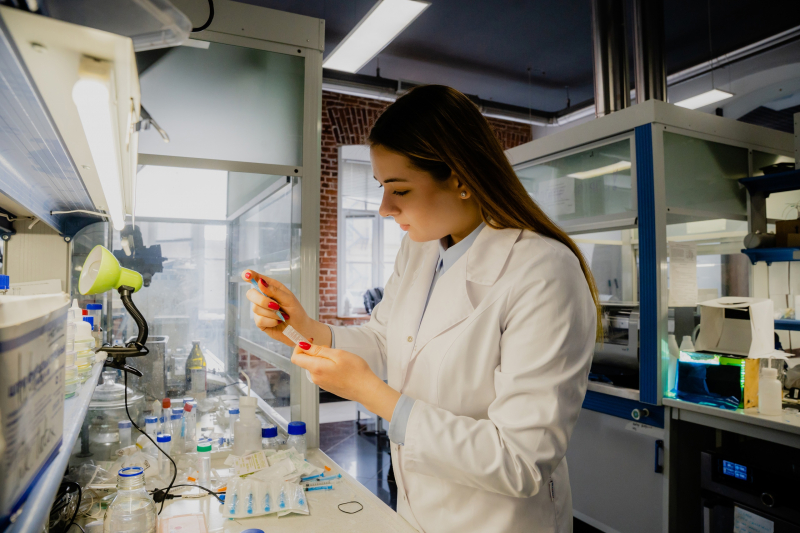Tatiana Statsenko, a second-year Master’s student at ITMO’s ChemBio Cluster, has recently spent a month and a half doing an internship in Skopje, the capital of North Macedonia. There, together with her colleagues from the Saints Cyril and Methodius University, she explored the synthesis of perovskite nanocrystals. ITMO.NEWS talked to Tatiana to learn more about her work, internship, and experience of living abroad during the pandemic.
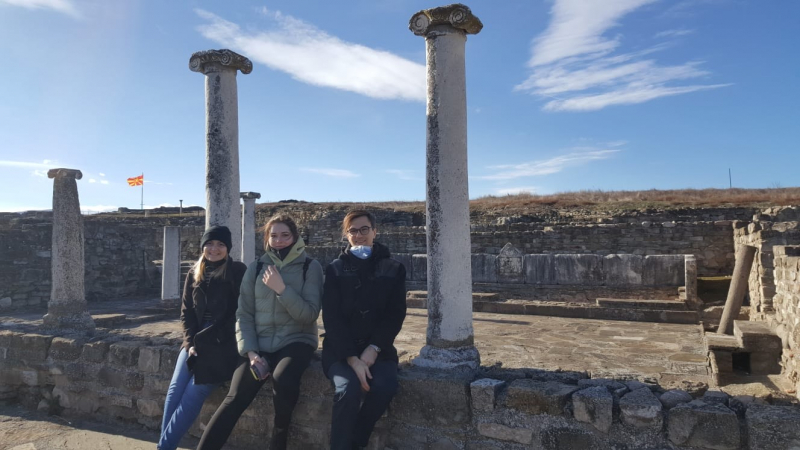
Tatiana Statsenko and students in North Macedonia. Photo courtesy of the subject
You’ve just got back from North Macedonia where you worked as an intern at the Saints Cyril and Methodius University. Could you tell us more about how you got into this internship?
In late 2020, I completed a scientific project, wrote an article, and was already preparing to graduate, when my supervisor, Alexander Vinogradov, offered me to take on a new project and work with our Macedonian colleagues. The project focused on the synthesis of perovskite quantum dots. Of course, I said yes. I’d never done an internship abroad before and for me, it was a great experience.
Did you face any problems when leaving for North Macedonia and returning?
I had no problems. There is a visa-free regime between the countries, so Russian citizens are eligible to stay there for up to 90 days. I only had to take a COVID-19 test and provide insurance.
How long was your internship?
It took one and a half months or 46 days, to be exact.
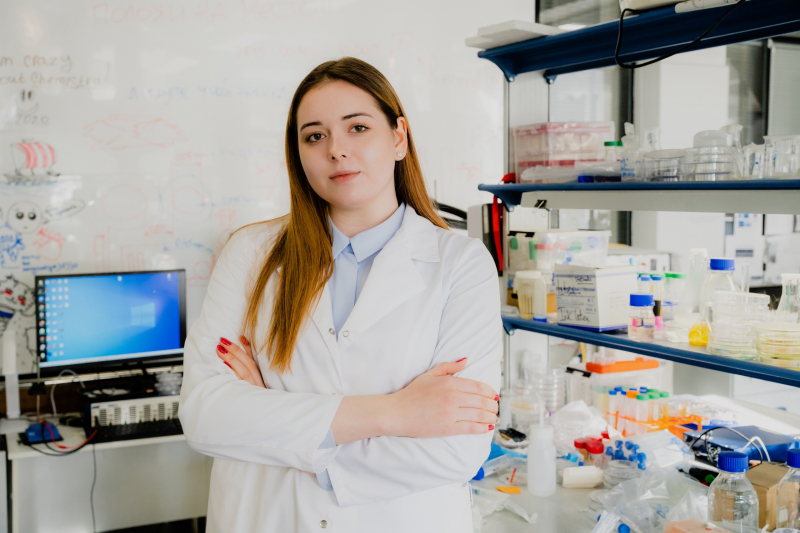
Tatiana Statsenko
What research project did you do?
I learned how to synthesize and study perovskite nanocrystals used to create phase holograms. To make this happen, scientists take a special film consisting of several layers. This film possesses a unique flare, which depending on the thickness of the film has either red, blue, or green tint. Introducing perovskite nanoparticles into the layers of this film partially increases its thickness and also changes its reflection color. This way we can obtain photonic images that will glow in the dark. I had never dealt with this topic before and it was new to me. Some things worked, some didn’t. But our Macedonian colleagues helped me to master the technology.
And why is this synthesis so complex?
It’s capricious. During synthesis, it’s crucial to control numerous factors, including temperature and humidity, not to mention that this process takes place in a vacuum.
Moreover, nanoparticles are produced in several stages. First, we obtain a precursor and check whether we really got what we need. Then, we use the precursor to create a different material, which will stimulate the growth of specific participles. It takes time and a number of reagents, which must be 100% pure. Otherwise, we won’t be able to produce participles of the desired shape and phase.
Are you going to continue the research in Russia?
Yes, of course. Once I came back to Russia, I started working with my colleagues. We will use the particles I received for the inkjet printing in our laboratory and obtain a multi-colored photonic image glowing under ultraviolet light.
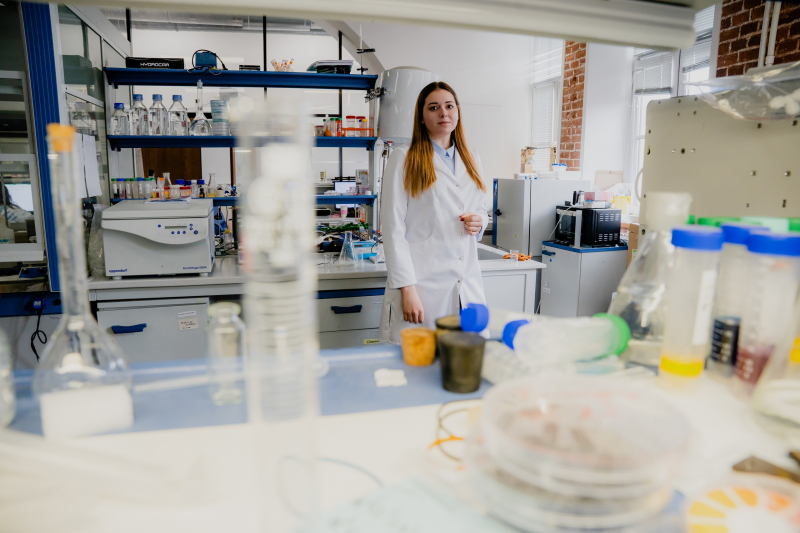
Tatiana Statsenko
What this technology can be used for?
Probably its most widely recognized benefit is the production of special tags that would confirm the authenticity of products. Such tags can be affordably and quickly printed on an inkjet printer and they will contain not one but several encrypted images at once. Some will be visible in ordinary light, and some – only under ultraviolet light. And such protection makes it more difficult to forge.
On research in North Macedonia
Why did you choose to do your internship in Skopje?
The long-time colleagues of my supervisor work at this university but I was the first among our students to join their laboratory. I assume that ITMO plans to engage more of its students and develop collaboration between the universities.
What is your impression of the internship?
Actually, I’m more than happy with my internship. I really enjoyed it! All labs offer up-to-date equipment and high-quality reagents, and I had the chance to work hand in hand with wonderful people. In truth, I was worried as it was my first internship. At first, it seemed a bit challenging. But thanks to the support of my colleagues, I did well by the end of my internship.
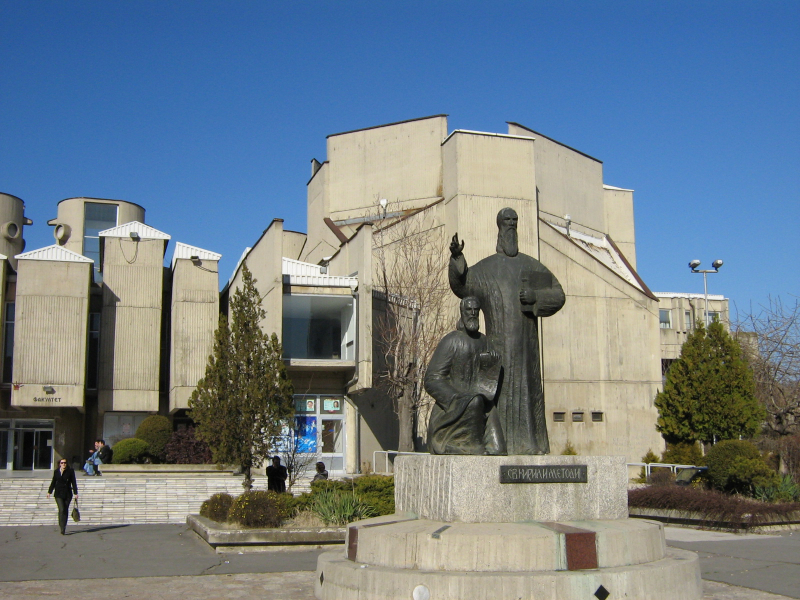
The Ss. Cyril and Methodius University in Skopje. Credit: smapse.ru
And what about the work process? Are there any differences in the daily routine, work plan, or perhaps in the habits of scientists?
Indeed, they have a completely different approach to work. Firstly, the workday begins at 8-9 am. For us, it seems too early as we don’t start till 10-11 am. In Russia, I can simultaneously run several experiments, for example, three to five syntheses at the same time, and then work in multitasking mode. While in North Macedonia you should focus on one topic and one goal. I’d call it a power-saving mode. There, scientists don’t waste their time on a series of experiments but strictly follow a plan. No need to spread yourself too thin as there is always tomorrow.
In fact, I’d say Macedonians really value their time and space. They work according to the working hours, so if we start at 9 am, we have to finish by 5 pm. It was hard for me. After all, some experiments require constant monitoring. But there you have to pause your experiments till the next day comes. In critical situations, we could stay longer at work but only for a couple of hours, not more than that.
You’ve said that their labs are well equipped. Did you have the chance to explore new technologies?
Yes, I did. I managed to work with a cutting-edge spectrophotometer that we don’t have. It is used to study the structure of materials. Other than that, the equipment is the same.
How has the pandemic affected lab work?
The university, along with many other facilities, was in fact closed, and only professors could work on-site. At first, I was the only student in the laboratory. It is a very unusual feeling! Then, a couple of students returned to work and, you might say, I brought the lab back to life.
On life in North Macedonia, travel, and restrictions
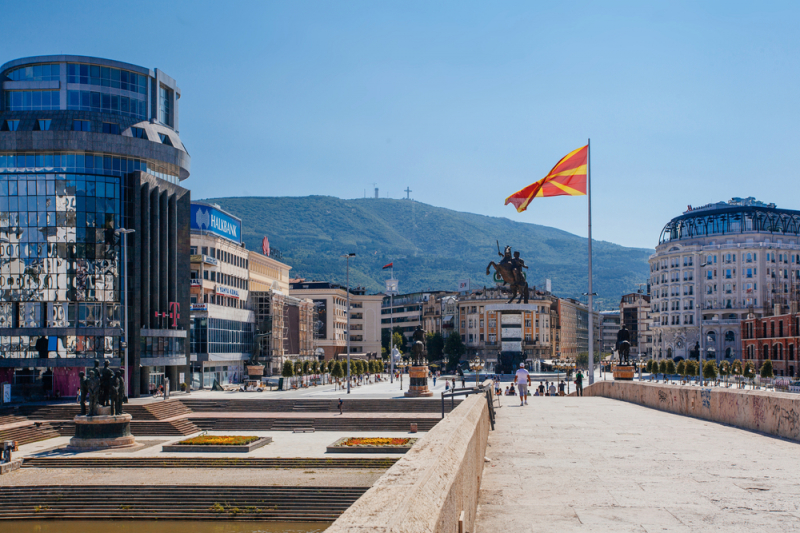
Skopje, North Macedonia. Credit: shutterstock.com
This is your first internship, and it’s not always possible to foresee certain issues when you do something for the first time. Have you experienced something like that? What would you recommend to our students who are about to do their internships abroad?
First and foremost, you should not stick to the information you found online but talk to people who live in the country you are going to. And this is coming from my own experience, it was said that tourists have no trouble to pay in euros everywhere. But the truth is that they have their own currency (dinars), so I had to look for an exchanger hastily just to pay for my accommodation.
And, of course, the language. I thought that I would speak English with everyone but, in fact, I could do so only in the laboratory. Mainly, people speak Macedonian and hardly understand English. That’s why it’s a good idea to download a translation app on your phone to simply read the inscriptions on the streets or the price tags in stores.
Did you have the opportunity to travel?
Yes, there was plenty of time as I had fixed working hours from 9 am to 5 pm. In the evening and sometimes at lunchtime, we went on little sight-seeing tours. My colleagues showed me around. I saw mountains, canyons, old towns, and visited museums as well.
What did you like most?
I was impressed with the beautiful nature. Skopje is located in a small lowland and surrounded by a range of mountains. So, you can see mountains from all angles. This is amazing! And there is also fresh air and lovely water.
And, of course, the climate. When I left, there were severe frosts in Moscow and St. Petersburg, and everything was covered in snow. And there, it was 15-18 degrees, so I spent the winter in a warm and comfortable environment.
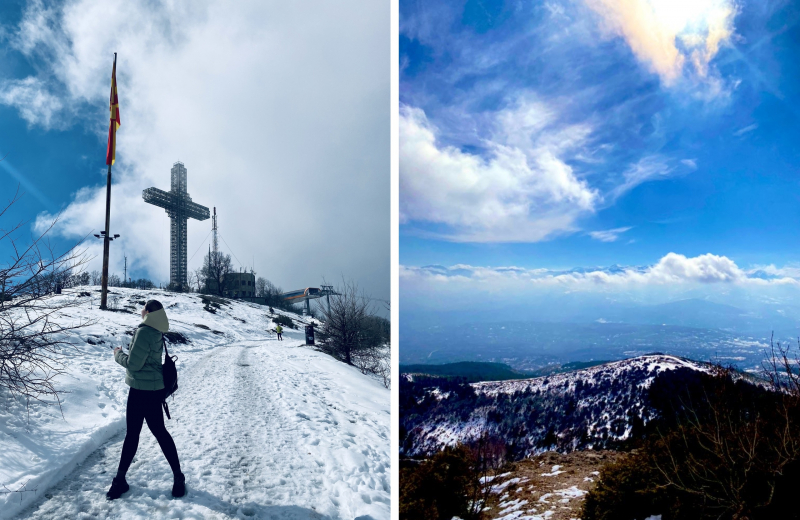
Tatiana Statsenko in North Macedonia. Photo courtesy of the subject
Has the pandemic affected your stay?
Most of the stores were closed. The restrictions were not as strict as in the rest of Europe, but you still had to wear masks on the streets. It was hard as we don’t do so in Russia. But then I got used to it. The fines were large and all precautions must be observed.
Would you like to return to North Macedonia again or maybe work elsewhere for your next internship?
I’ll definitely come back as a tourist and visit its gem – the resort town of Ohrid by the cleanest lake in Europe. We haven’t been there. And for the internship, I’d like to try something else.
(source https://news.itmo.ru/en/education/students/news/10177/)
